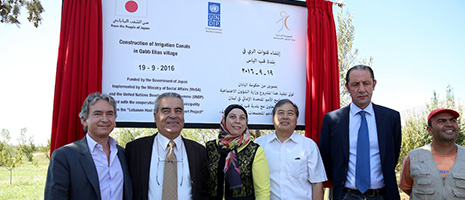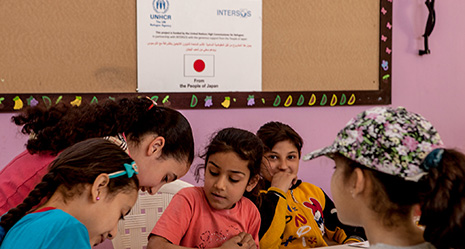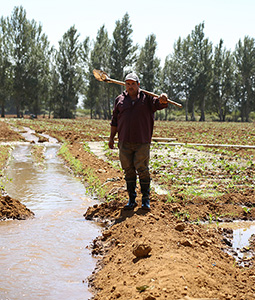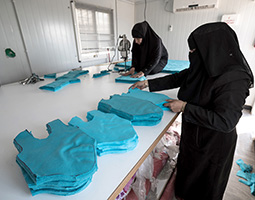Home > Highlighting JAPAN > Highlighting Japan December 2016 > Sixty Years of Commitment: Japan and the UN
Highlighting JAPAN


Refugee Response
Japan’s support for refugees and their host countries and communities continues to be extended through international organizations.
The number of refugees in the Middle East has grown rapidly since the conflict in Syria broke out in 2011. According to the United Nations High Commissioner for Refugees (UNHCR), about 4.8 million Syrians have fled to other countries, such as Lebanon, Jordan and Iraq, while approximately 6.5 million people are displaced within Syria.
Japan has provided a total of more than 1.65 billion US dollars to date to address the refugee issues in Syria and its neighboring countries. At the United Nations Summit for Refugees and Migrants held in September 2016, Prime Minister Shinzo Abe described the characteristics of Japan’s assistance in the field thus: “We provide development cooperation to promote self-reliance among the refugees and economic development of the host countries alongside our emergency humanitarian assistance.” Japan calls this approach “the humanitarian and development nexus.”
Japan’s assistance projects for Syria and its neighboring countries are often implemented in cooperation with UN agencies. For example, Japan contributed a total of three million US dollars to support the Economic Empowerment of Syrian Women Refugee project, which was run by UN Women in Jordan, Iraq, Lebanon, Syria and Egypt from 2014 to 2016. One of the pillars of the project was to provide support for women’s community centers/safe spaces.
“Among refugees, women are very vulnerable,” says Naoko Yuki of the UN Women Japan Liaison Office. “Refugee women need a safe place where they can gather and socially interact.”
The community centers offer vocational training to support the economic independence of women. In Egypt, UN Women works in partnership with local NGOs to provide vocational training for Syrian and Egyptian women, leading to the advancement of the capacity of women and intercultural exchange among women in a vulnerable position.
As part of the project, UN Women also operates the Cash for Work program, in which they provide work opportunities and wages to refugee women. For example, in the Za'atari refugee camp in Jordan, Syrian women are engaged in the sewing and tailoring of school uniforms and baby clothes. Through the Cash for Work program, which has been implemented in four countries, more than 900 women have earned wages, benefiting approximately 30,000 families.
Japan also provides support through the United Nations Development Programme (UNDP) to the agricultural development project in Lebanon. In September 2016, with the support of one million US dollars from Japan, the UNDP completed the assistance in construction of about 11 kilometers of irrigation canals in Qabb Elias, in the Beqaa Governorate of northeastern Lebanon, which has been accepting many Syrian refugees. With this support, approximately 800 Syrian refugees were employed as construction workers, and approximately 1,100 farmers and citizens benefitted.
The irrigation canals will enhance the speed and quantity of the water supply to farmlands, which is expected to increase the agricultural productivity and improve the livelihood of farmers and citizens. Such assistance plays an important role in social stability in areas that are overloaded with incoming refugees.
Japan also supports seven community centers operated by the UNHCR in Lebanon. Open not only for Syrian refugees but also for Lebanese citizens, the community centers provide vocational training and educational programs for children and vulnerable people.
According to the Global Trends 2015 report published by the UNHCR in June 2016, the number of people who were forced to displace due to conflict or persecution reached a record high of 65.3 million as of the end of 2015. The majority of the population comes from one of three countries: Syria, Afghanistan and Somalia.
At the United Nations Summit for Refugees and Migrants in September, Prime Minister Abe announced that Japan would commit to providing an assistance package of about 2.8 billion US dollars between 2016 and 2018 as humanitarian and self-reliance assistance to refugees and migrants, and assistance to host countries and communities to strengthen the abovementioned humanitarian and development nexus.
Japan has offered refugee assistance based on the principle of supporting coexistence between refugees and people in host countries and providing inclusive support for those in the most vulnerable situations, no matter where they come from. Because it has fulfilled its promises, Japan is strongly trusted by the agencies in the United Nations supporting refugees. Japan will continue to support refugees and the host countries and communities.
© 2009 Cabinet Office, Government of Japan








